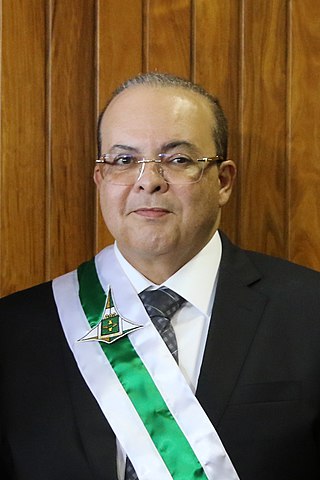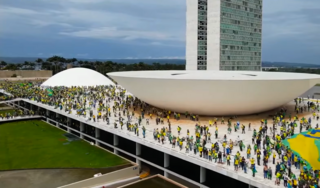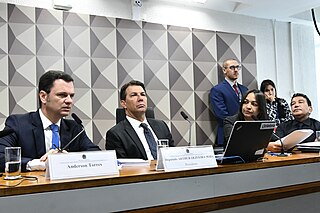
The Liberal Party is a far-right political party in Brazil. From its foundation in 2006 until 2019, it was called the Party of the Republic.

Alexandre de Moraes is a Brazilian jurist, currently serving as president of the Superior Electoral Court and as a justice of the Supreme Federal Court.

Ibaneis Rocha Barros Junior is a Brazilian politician, lawyer and the current Governor of the Federal District. He defeated incumbent governor Rodrigo Rollemberg with 69% of the popular vote. A member of the Brazilian Democratic Movement (MDB), Rocha is the first Federal District native to serve as its governor.

The 56th Legislature of National Congress was a meeting of the legislative branch of the Federal Government of Brazil, composed by the Federal Senate and the Chamber of Deputies. It convened in Brasília on 1 February 2019, a month after the beginning of Jair Bolsonaro's only term as president, and ended on 31 January 2023.

General elections were held in Brazil on 2 October 2022 to elect the president, vice president, the National Congress, the governors, vice governors, and legislative assemblies of all federative units, and the district council of Fernando de Noronha. As no candidate for president—or for governor in some states—received more than half of the valid votes in the first round, a runoff election for these offices was held on 30 October. Luiz Inácio Lula da Silva received the majority of the votes in the second round and became president-elect of Brazil.
The 2020 Brazilian protests and demonstrations were popular demonstrations that took place in several regions of Brazil, in the context of the COVID-19 pandemic in Brazil. The protests began on March 15, 2020, with demonstrations in support of President Jair Bolsonaro, the target of several investigations, and against the isolation measures imposed by state governments.

The 2021 Brazilian protests were popular demonstrations that took place in different regions of Brazil in the context of the COVID-19 pandemic. Protests both supporting and opposing the government happened.

Anderson Gustavo Torres is a Brazilian chief of police of the Federal Police, who served as Minister of Justice and Public Security under Jair Bolsonaro. Following the 2023 invasion of the Brazilian Congress, Torres' arrest was ordered by the Supreme Federal Court.

Events in the year 2022 in Brazil.

Luiz Inácio Lula da Silva and Geraldo Alckmin were inaugurated as 39th president of Brazil and 26th vice president, respectively, on 1 January 2023, in a ceremony held in the National Congress in Brasília, beginning the third Lula administration. At the age of 77, Lula became the oldest president-elect to assume office and the only president in Brazilian history to serve two non-consecutive terms in office through the democratic vote.

The 2022–2023 Brazilian election protests began shortly after the conclusion of the 2022 Brazilian general election's second round on October 30, in which Luiz Inácio Lula da Silva was elected president, which led to mass protests and roadblocks nationwide. Supporters of Jair Bolsonaro, who are frequently referred to in media accounts as Bolsonaristas, alleging election fraud, began blocking roads and highways in the country. At least 23 Brazilian states, plus the Federal District, recorded roadblocks as of 1 November, adding up to at least 267 roadblocks according to data from Federal Highway Police (PRF).
Police operations in the 2022 Brazilian general election were coordinated actions carried out by the Federal Police of Brazil and the Federal Highway Police, mainly during the second round of the 2022 Brazilian presidential election. They targeted public transportation vehicles, mainly in the Northeast Region, Brazil, allegedly with the aim of ensuring transportation safety according to their supporters, or delaying the arrival of these vehicles at polling places according to critics.

On 8 January 2023, following the defeat of then-president Jair Bolsonaro in the 2022 Brazilian general election and the inauguration of his successor Luis Inácio Lula da Silva, a mob of Bolsonaro's supporters attacked Brazil's federal government buildings in the capital, Brasília. The mob invaded and caused deliberate damage to the Supreme Federal Court, the National Congress building and the Planalto Presidential Palace in the Praça dos Três Poderes, seeking to violently overthrow the democratically elected president Lula, who had been inaugurated on 1 January. Many rioters said their purpose was to spur military leaders to launch a coup d'état and disrupt the democratic transition of power.
Many journalists compared the events of the 2023 Brazilian Congress attack to the January 6 United States Capitol attack. Several newspapers, including O Globo, Veja, and Folha de S.Paulo, characterised what happened as terrorism. O Estado de S. Paulo and El Mundo described the event as an attempted coup d'état. On 9 January, tens of thousands of people attended rallies against the rioters in many Brazilian cities. Supreme Federal Court considered the attacks as terrorist acts.

The National Congress Palace is a building in Brasilia, Brazil that serves as the meeting place of the Brazilian national legislature, the National Congress of Brazil. It was built in 1960.

During the 2023 Brazilian Congress attack, numerous works of art were targeted by supporters of Brazilian former president Jair Bolsonaro.
Operation Lesa Pátria is a set of ongoing investigations led by the Federal Police of Brazil investigating financiers, participants, and organizers of coup d'état attempts in Brazil, particularly related to the attacks on the headquarters of the Three Powers on January 8, 2023, in Brasilia. The task force is considered permanent by the Federal Police, with "periodic updates on the number of warrants issued, people captured and fugitives". Operation Lesa Pátria is the largest police operation launched in Brazil since Operation Lava Jato (2014-2021).

The 8 January CPMI was a parliamentary inquiry commission in Brazil that investigated the invasion and attack of the Praça dos Três Poderes against the National Congress of Brazil on 8 January 2023.
Hate cabinet is the moniker attributed to a group of advisors to Brazilian ex-president Jair Bolsonaro which operated within the Palácio do Planalto, the country's executive branch headquarters, during Bolsonaro's term. They were coordinated by the former president himself and by his son, Carlos Bolsonaro. The group managed the former president's social media activities. It was established during the campaign for the 2018 Brazilian Presidential Election and remained active at least until the end of his term in 2022.

During and after the 2022 Brazilian presidential election, a network of members of former president Jair Bolsonaro's government and of the Brazilian Armed Forces planned to subvert the transition of power to newly elected president Luiz Inácio Lula da Silva, arrest Supreme Federal Court (STF) justice Alexandre de Moraes, and shut down the National Congress and the Supreme Court. The plans, evidence, and individuals involved in planning a coup d'état were gradually revealed in investigations conducted by public agencies and the press in 2023 and 2024.
















